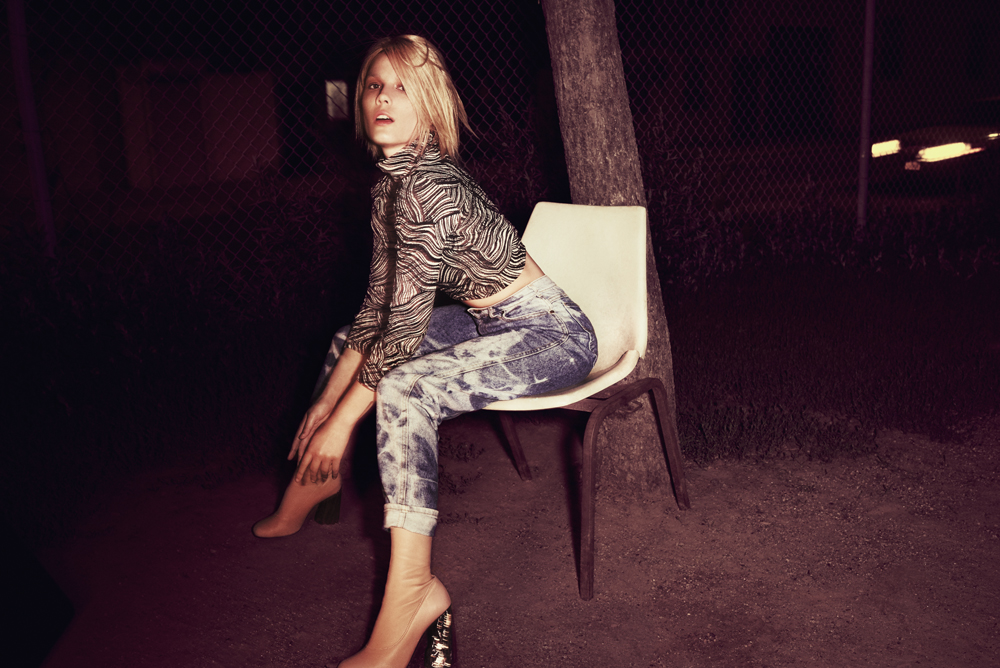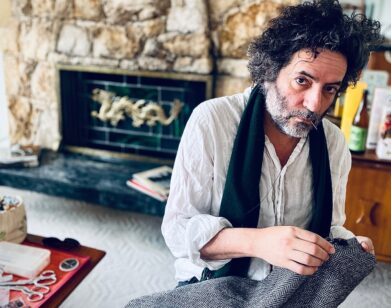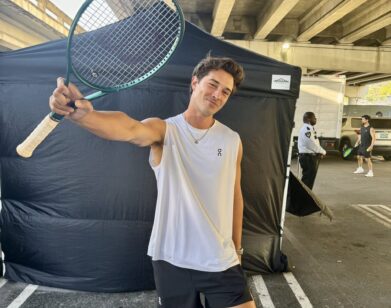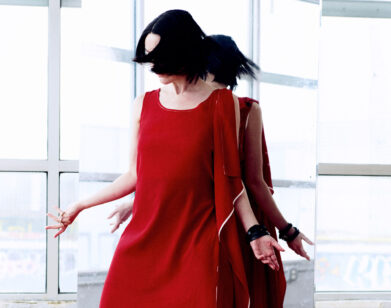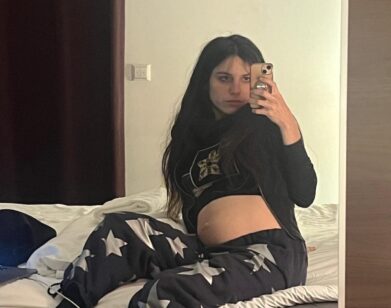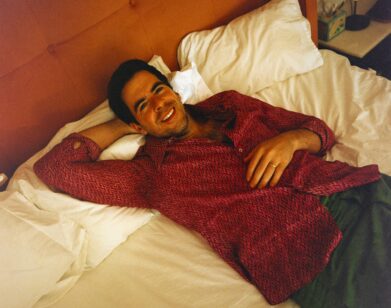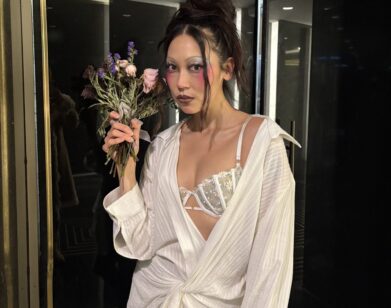Halsey’s Uncharted Territory
HALSEY IN BROOKLYN, NEW YORK, JUNE 2015. PHOTOS: RAF STAHELIN. STYLING: KATIE BURNETT. HAIR: KENSHIN ASANO/L’ATELIER NYC. MAKEUP: CEDRIC JOLIVET/SEE MANAGEMENT. HAIR COLORING: AURA/LALALAND ARTISTS.
Ashley Frangipane, a 20-year-old singer-songwriter better known as Halsey, began her music career as an artistic and social experiment born out of frustration and a dire need to be heard. Taking an autodidactic approach, Halsey independently released the track “Ghost” in 2012, and was discovered and signed to her current label, Astralwerks, literally overnight. Since then, she has released an EP Room 93 last year and her debut LP, Badlands, this past Friday.
Produced by Lido, the Badlands often relies on religious imagery and rhetoric to deconstruct Halsey’s fascination with idolization. Individually, however, her songs are layered, moody, and stylistically stratified. A track like “New Americana” offers millennial foresight, as Halsey sings: “We are the new Americana / High on legal marijuana / Raised on Biggie and Nirvana / We know very well / who we are / so we hold it down when summer starts.” Similarly, the noteworthy “Roman Holiday” reflects Halsey’s ability to produce alternative pop sounds that rivals the likes of Lorde, Katy Perry, and Lana Del Rey.
Just before Badland‘s release, we caught up with the Los Angeles-based musician over the phone.
LEA WEATHERBY: Halsey is not only an anagram for your name, but it’s also the name of a street you lived on in Brooklyn, New York. What about the East Coast inspires you and your writing?
HALSEY: I love how it’s constantly evolving. There’s so much life, you’re constantly engaged, and I think I need that, but that’s why the West Coast is good for me right now. It’s almost like the detox phase where I’m not confronted by so much life and movement all around me. It’s helpful because touring can get overwhelming, cognitively, and it’s tremendously stimulating at the same time. I just got off a two-month tour with Imagine Dragons and we saw the whole country. It’s great doing an arena thing, performing for 20,000 people a night. I truly had moments like, “Holy shit, is this happening?”
For me anyway, it happened very quickly and I was in a very different position this week than I was last week, and I’ll be in a very different position next week than I am this week. I write songs very quickly, so the 20 minutes of joy I get out of writing a song doesn’t compare to the two months of joy I get engaging with the people who like my music.
WEATHERBY: You’re able to write your songs in 20 minutes? What’s that process like?
HALSEY: It usually takes me 20 to 90 minutes to write a song because once I start, I don’t stop. If I start writing a song and you try to have a conversation with me, you’re a bad person. [laughs] I like when it’s really organic, so I try to knock it out in one shot. Some of these songs on the new record just kind of spilled out of me and those are the ones I keep. The ones that people are pulling apart and saying, “You should do this and you should do that,” those songs never make the record because they’re not real.
WEATHERBY: Oftentimes you can feel when something is forced.
HALSEY: Yeah, you can tell if there’s magic in something. When you start it, you want to finish it and you want it to be perfect. If you’re not inspired and you’re working hard to pull inspiration from somewhere and make a song something it’s not, then it’s very contrived and I don’t like to write music that’s contrived. As a songwriter, pop music really is a love and a joy and a science, and I feel like a lot of people look at pop music with a very formulaic perspective in numbers and patterns, but an outsider would think that the process is very natural. It is, but there are a lot of times where people treat it like a sport. There are tricks you can pull, different combinations that make something better. I don’t really think I approach it that way, but I definitely have a love for the science that is pop song writing.
WEATHERBY: You previously wrote and released the song “Ghost,” which led you to sudden and overwhelming recognition. What was that experience like?
HALSEY: We got that song out really quickly, and I wasn’t in bands, I didn’t have any representation, and I had no interest in being a singer. It was just a cool song and I had some friends who were like, “If you put this up and it gets popular, you can make a quick thousand bucks.” After I put “Ghost” up online, that night I was heard by five record companies. I called my friend Anthony and I said, “Holy shit I’m freaking out, can you come to the city and pretend to be my manager?” He was like, “Yeah I can pretend to be your manager!” That was the moment for me, sitting on this couch and having people say, “You have a gift for this.” That’s when all the pieces of the puzzle came together and it dawned on me that it wasn’t about making $1,000; it was about what I was supposed to do. I had 24 hours to decide and the decision was very easy to make. From that day on I’ve been an artist. I didn’t have to become one, I just needed someone to show me the signs.
WEATHERBY: What is the concept behind the album’s title and what does it mean to you?
HALSEY: Badlands spawned out of my fascination with the concept of isolation in hotel rooms and this idea of being in a place where thousands of people have temporarily lived before you. It’s such a bizarre thing because in a hotel room, there’s nothing to challenge you, there’s nothing to provoke you or trigger you to see who this person in front of you really is. I got so obsessed with this parallel universe, this dystopian, post-apocalyptic civilization, and I started thinking, “What do the people here look like? What do the colors look like? What’s its history?”
Halfway through writing this record, it dawned on me that this entire thing was a metaphor for what’s in my head. There’s a booming, rotating, never sleeping city in the center of my brain and no body can come in and I can’t escape. I have a strange sense of pride that my brain works that way, but I’m also terrified of what would happen if I ever tried to think in another way. That realization was really heavy for me but also strangely therapeutic in terms of coping with my own isolation and the way my life was changing.
WEATHERBY: It always feels good to explore something that challenges you, but it can be as emotionally taxing as it is empowering. How are you feeling about the upcoming release?
HALSEY: I’m excited. I think I’m in such a beautiful position right now with everything. The thing about being an artist is that you evolve so quickly, you grow, you learn, you change, you find yourself hating work that you made months prior. That’s the hard part about making an album, but every couple days I fall asleep listening to my album front to back and I lay there feeling so proud of what I did. I love every song on this album and I did everything in my power to achieve that. I think if I didn’t try that hard and people didn’t like it, then I would find myself in the fetal position in my house. [laughs] But if people don’t like it, then all I have to do is put my hands up in the air and say, “Okay, well that’s the best that I could do.” If you don’t like it, then that means it wasn’t right for you and that you wanted it to be something that it’s not, because I made it exactly what it was supposed to be.
WEATHERBY: It must be liberating too, in a sense, to have a level of self-awareness that enables you to deconstruct what’s going on in your head.
HALSEY: Yeah it’s definitely liberating but it’s also terrifying. I was having a conversation with a friend of mine the other day about David Foster Wallace—he woke up every day and he could not fathom how he was instrumental in other people’s lives and he couldn’t understand how his existence meant something to other people who looked up to him. I think I’m the exact opposite: I wake up every day and think about what I am to other people. What I am to the people I employ, who depend on me to wake up and do my job that day and keep this career going? I think about what I am to the kids who listen to my music and all the other people involved in this project.
WEATHERBY: The opening track, “Castle,” is such a strong introduction to the album. What’s the significance of that structure in the context of the album as a whole?
HALSEY: “Castle” is my first song from the perspective of someone in the music industry and it’s this idea of me gunning for my moment. Sonically, the nontraditional percussion and the choir supported the idea that there’s a massive population. There’s some religious imagery in it, too. Being an artist and having a following can be a very scary thing because idolization makes you question your inner role in the universe. A lot of people get caught up in this idea of, “Wow! This world does revolve around me,” and it most certainly does not. It’s the exact opposite; these people don’t exist for you, you exist for them.
BADLANDS IS OUT NOW. FOR MORE ON HALSEY, VISIT HER FACEBOOK.

